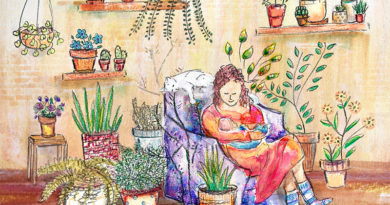Growing Up and Changing Schools
 As our children grow and change, we parents develop new perspectives on their potential. Preschools and kindergartens are often their first social environments, and if we are lucky enough to be able to choose the style, language and culture of their early education, we can get an insight into their individual talents and how they acquire new skills outside the home. We start to plan their entry into the formal school system with anticipatory pleasure. As they approach school age (in Switzerland the school curriculum kicks in properly at age seven), we muse on what sort of education will suit their personalities and prepare them well for the future. In order for our children to make friends and really enjoy schools, parents need to think beyond “shopping around” for tangible benefits. Neither a “new language” nor “social integration” can be guaranteed from a few years of institutional education. In my experience, the gains that a parent tries to quantify are less important than the culture, values and educational philosophy in the heart of which your child is going to be spending their daily life.
As our children grow and change, we parents develop new perspectives on their potential. Preschools and kindergartens are often their first social environments, and if we are lucky enough to be able to choose the style, language and culture of their early education, we can get an insight into their individual talents and how they acquire new skills outside the home. We start to plan their entry into the formal school system with anticipatory pleasure. As they approach school age (in Switzerland the school curriculum kicks in properly at age seven), we muse on what sort of education will suit their personalities and prepare them well for the future. In order for our children to make friends and really enjoy schools, parents need to think beyond “shopping around” for tangible benefits. Neither a “new language” nor “social integration” can be guaranteed from a few years of institutional education. In my experience, the gains that a parent tries to quantify are less important than the culture, values and educational philosophy in the heart of which your child is going to be spending their daily life.
In Switzerland there are several points when children move schools so there is little pressure to get them into one type of school from the start. Here, children move after kindergarten at six or seven years old, and change teachers after the first three years of formal school. They move schools at the end of sixth class, the last year of primary school (age 12) and often again at ages 14 or 15. So you do not need to worry if it takes a few years to get on the right track for the predictable future. As children get older they have their own views and might be reluctant to change, so one challenge for parents is to help them make transitions to a school that will suit them in the future, even if they cannot see it clearly themselves. Many international parents, however, may not have a clear view themselves of options in this day and age, let alone in a new country, which makes choosing a local Swiss system feel like groping around in the dark!
Parents’ own experiences of education often affect their decisions about which school their children should attend. You should try to articulate your expectations so you can ask questions when visiting a new school.
English speakers beware: the familiar territory, if you grew up in the U.S., U.K., Australia, or another English-speaking country, probably included schools where school was a whole world in miniature, where playing musical instruments and team sport were standard options and could take place on school grounds, and where the concept of a community was combined with attending lessons and making the grade. Here in Switzerland and in many parts of Europe, school is more narrowly defined and is simply where traditional and formal education happens – education in the sense of lessons with a qualified teacher. Even break times in the playground in Switzerland may not be supervised beyond kindergarten, and extracurricular activities in my neighbourhood are provided via the School and Sport Department or at local music schools, making them clearly the responsibility of the parents rather than the school. It is not that local people do not see children are learning in all situations, but schools are simply not perceived as responsible for these other dimensions of a child’s life. Swiss parents often join Vereine (clubs and associations) representing their favourite sports or musical activities, or participate in cultural clubs where pastimes are a family tradition.
For this reason, a Swiss school, whether public or private, may not be the place where your children are going to make friends for life. At ages five, seven, 10, 12, and 14, pupils are changing phases of education, often changing teachers and possibly schools too. Beyond kindergarten, many local parents do not arrange play dates, they leave it up to the children to organise amongst themselves while they focus on their own friends whose children may not be at the same school. Even if your child makes friends in the neighbourhood and can play safely in the streets with them, you may not become close friends with the parents. Obviously only those who stay in the same neighbourhood over a long period of time might still see the same children around, but enduring friendship with them is not guaranteed. The bonds children make locally are less fundamental than expats often imagine.
I value the “expat bubble” even more after nine years of seeing my own child’s friends change completely at four different schools in the Swiss system. Changing schools often, let alone a dialect and languages, is not conducive to long-term friendships. But by developing individual hobbies and interests outside school, some social continuity can be maintained. For more than five years my son has attended a German-speaking Taekwondo club, a Swiss boys’ band and also a very international and English junior cricket club, all weekly activities in Zurich. Children gain perspective if they can swap experiences of living abroad with others living across cultures, so think about who you want your family friends to be, and treasure the interesting people you meet whether they be international or Swiss. By keeping a realistic view of the difference between social acceptance and social integration, expat families can avoid romanticising the “going local” project.
You know when living abroad that your child’s schools, hobbies and social circles may be quite different from the kind you grew up with. But they are all places where your child might make important friendships if they find common ground with others. And perhaps you can get to know the parents, too, and create a small community of friends for your family whom you will feel close to, regardless of the changeability of your children’s schools over the course of education in the Swiss system.
By Monica Shah
Monica Shah is the founder and head of Children First, an early years education centre in Zurich. Parents of children there become members of the Verein, a community association organising cultural, educational and social events for parents of young children living abroad. Her son attends Taekwondo at: Taekwondo Terra Nova, the orchestra of KMZ, and cricket with ZCCC.
Photo by Cloudia Chen
Cloudia Chen is a portrait photographer specializing in family and children’s photography. Before settling in Zurich, she lived in Mainland China, Hong Kong, London and the South of France. Her photos and articles have been published in various social media and popular travel magazines in China. To contact her please visit her website www.cloudiachen.com.




”For this reason, a Swiss school, whether public or private, may not be the place where your children are going to make friends for life. ” This part doesn’t gel with our experiences. The classes in our local Swiss school do not change at all throughout primary school. So when you’ve completed 6 years of primary school, you know those kids really well. And many of the same kids were in the same kindergarten classes too. Going even further back to 2 years of age, my kids have known some of their classmates since ‘Spielgruppe’. So this stability is fairly normal in villages and suburbs around Switzerland, is my experience. After all, these kids are your neighbours or near neighbours so you have physical proximity as well as the continuity built up through school.